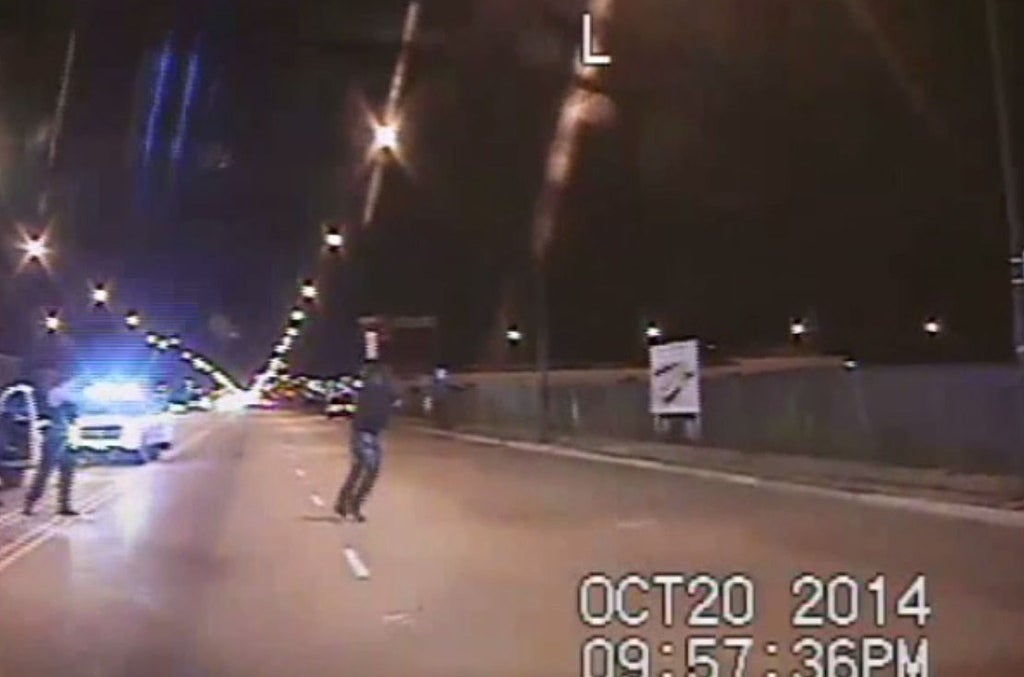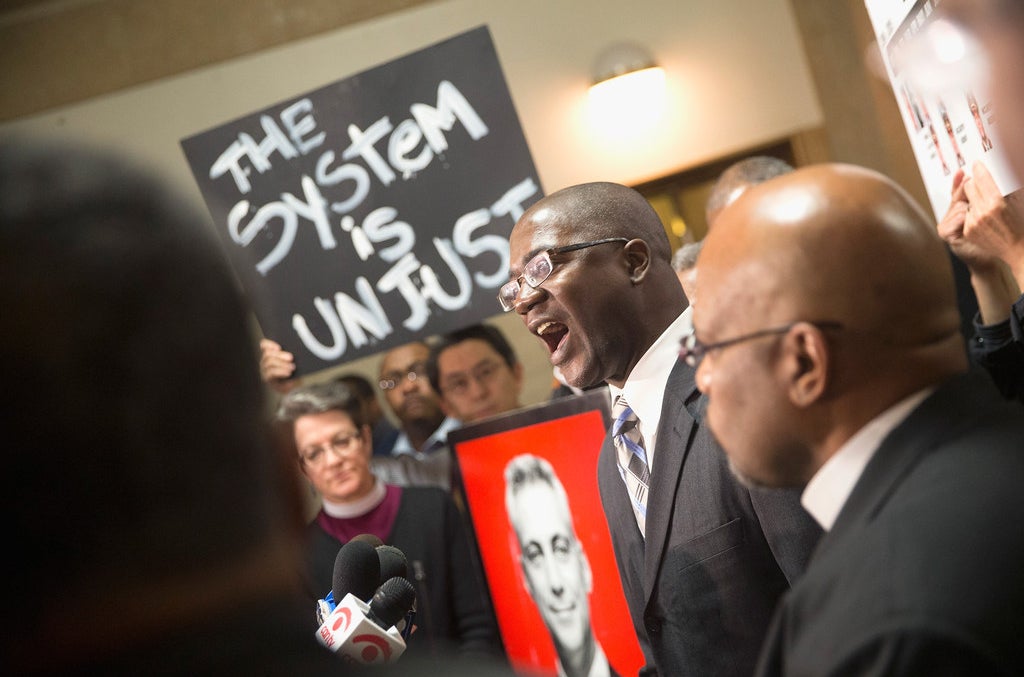

To determine whether police officer Kevin Fry justifiably shot and killed 17-year-old Cedrick Chatman as he ran from police in January 2013 — holding what official reports described as a "dark object" in his hand — video surveillance would be key. So Lorenzo Davis, a supervisor with the independent agency that reviews police shootings in Chicago, called up video footage from cameras in a corner store, a school, and a city street.
Davis screened the videos for evidence Fry adhered to police protocols, which Davis says he once taught. He looked for Fry to reach for his Taser. Davis didn't see it. Or for his radio to call for backup. No indication. And what about the final, shouted warning to stop that Davis says an officer is supposed to give? Nothing, Davis said.
What Davis did see, he told BuzzFeed News, was Fry — who'd fired his weapon along with another officer in another fatal shooting of a 17-year-old six years earlier — "trying to get a clear shot of Mr. Chatman so he could shoot him."
Convinced Fry abandoned use-of-force protocols, Davis submitted a report concluding the shooting was unjustified.
And then Davis, not Fry, was fired.
What Davis says happened to him cuts to the heart of the controversy over police shootings and their alleged coverups that has engulfed Chicago in protests in past weeks. Community advocates have decried Chicago officials' attempts not to release video footage of police shootings and other incidents where people die in custody.
The most recent development came Wednesday, when a federal judge delayed releasing the Chatman videos Davis reviewed. Attorneys for the city argued releasing the video could bias potential jurors in a civil suit Chatman's mother has filed against the city over her son's death. U.S. District Court Judge Robert Gettleman is scheduled to rule Jan. 14 on the video's release.
The Chatman footage would have been the third video showing Chicago police shooting young black men since Nov. 24, when video of white officer Jason Van Dyke firing 16 shots at 17-year-old Laquan McDonald became public due to a judicial order. This week, the Department of Justice launched a civil rights investigation of the police force; Mayor Rahm Emanuel apologized for McDonald's death; and the man who fired Davis, Scott Ando, has been replaced as Chief Administrator of the Independent Police Review Authority (IPRA), the civil agency responsible for reviewing officer-involved shootings and excessive force complaints.
Davis alleges Ando is part of the reason officers like Van Dyke — who in his 14 years on the force received five times as many formal complaints as the majority of other officers do over the entirety of their careers, according to data available through the Invisible Institute — were never disciplined or removed from the force.
And Van Dyke wasn't an exception. IPRA investigated 407 shootings since Sept. 2007. It signed off on all but two of those shootings — more than 99 percent — as justified.
According to Davis, those numbers suggest just how broken the police oversight system is. A former Chicago police commander and lawyer before joining IPRA in October 2008, Davis said his team of investigators determined on six separate occasions that police shot unjustly. And on those six occasions, he said Ando or second-in-command Stephen Mitchell asked him to change his findings. Each time, Davis refused. The sixth refusal, the Chatman case, cost him his job.
"In Chicago, they've used the Independent Police Review Authority to hide and cover-up rather than to be transparent with these incidents," said Davis, 65. "There are officers who will use deadly force when they didn't have to use deadly force and they know they don't have to use it."
Davis joined IPRA with a firsthand knowledge of the dangers of policing and the pressures officers face. In 1984, a man shot and killed Davis' partner; the future investigator returned fire, killing the man. In another instance, Davis said, a man pulled a knife and Davis shot him in the shoulder. The man survived and later sued, settling for $15,000, according to Davis' lawyer, Torreya Hamilton.
But at the review authority Davis grew concerned about Ando's leadership, and its effect on the authority's ability to monitor police officers' actions. Not long after Ando took over, in May 2013, Davis logged into the agency's computer database, and found, he said, that reports he had previously filed were altered, determinations changed — all without his knowledge and all in favor of the officers he was investigating.
Then there was the March 20, 2015 memo from Ando, obtained by Chicago radio station WBEZ, outlining a new policy. According to WBEZ, the policy stated that investigators "do not have the right to refuse to make changes as directed by a superior. Anyone who refuses . . . will be considered insubordinate and may be subject to discipline."
That's the policy Davis tested six times.
After the Chatman shooting, Davis says he was given a performance review.
Under Ando's predecessor, Davis had received an overall excellent rating on his work performance, according to a 2013 employee evaluation provided by Davis' attorney. But a June 2015 evaluation told a different story. In the comments section, the reviewer wrote, "Davis has repeatedly exhibited an inability to be flexible and repeatedly refuses to comply with decisions different from his made by IPRA management directing him to change improper findings. . . .Davis lacks objectivity. . .and 'cherry picks' only those facts that support his goal of reaching the finding he desires."
The evaluation refers to the six times Davis refused to changes his findings and reads, "the investigations were reviewed by the Deputy Chief, 1st Deputy Chief and Chief, all of whom agreed that the facts and evidence contained in the Summary Report. . .were inaccurately and incompletely reported and summarized; incorrectly analyzed; and findings were reached that were supported only by SI Davis' lack of objectivity."
Davis says he wrote a rebuttal. A week later, he was called into his boss's office. Davis remembers Ando saying, "I read your rebuttal. I've decided that you're always trying to prove that you're more intelligent, more educated, you have more experience and you're smarter than anyone. You're done." Ando handed him a termination letter, Davis says, and had him escorted out of the office.
BuzzFeed News reached out to the Ando and Mitchell through IPRA's spokesman, who declined comment. BuzzFeed also sent detailed questions to Ando's and Mitchell's attorney. No reply has been received.
A statement submitted to WBEZ last summer issued by IPRA on behalf of Ando stated, "A few cases [Davis] worked on were found to be incomplete by all three levels of management above him." The findings "did not include all available evidence and in some cases were built on assumptions."
The lawyer for Chatman's family, Brian Coffman, told BuzzFeed News the city attorney's arguments against releasing the video are a "stall tactic" and noted that at the same time the judge delayed the video's release, Emanuel called for transparency at a meeting with city leaders a few blocks away.
"They've been covering this up since the shooting occurred," Coffman said.
He says Chatman's family is undeterred by the delayed ruling and has followed Davis's actions.
"Ms. Chatman doesn't want the death of her son to go unnoticed," Coffman says. "She wants his death to be a positive for the city of Chicago and for the police to be held accountable and people who investigate police officers to be held accountable. We're at the start of the tidal wave."
And Davis, for his part, might have been the first ripple. The "dark object" in Chatman's hand was a black iPhone box.
